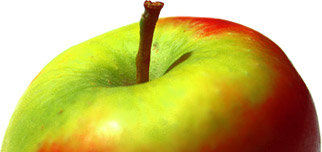An old Yorkshire culinary apple, thought to have arisen in the 18th century. Rated by the Victorian author Hogg as first-rate, it was nevertheless superseded in Victorian times by larger culinary varieties with better keeping qualities. Nevertheless it has the juicy acidity which is the basic requirement of a cooker. Its common alternative name - Yorkshire Goosesauce - hints at its culinary use to cut through the fat of winter goose recipes.
Yorkshire Greening is a good variety to grow in difficult locations - it is a tough tree and a reliable cropper.
USDA identification images for Yorkshire Greening
The identification paintings in the USDA Pomological Watercolor Collection span the years 1886 to 1942.
Citation: U.S. Department of Agriculture Pomological Watercolor Collection. Rare and Special Collections, National Agricultural Library, Beltsville, MD 20705.
Visitor reviews
- 28 Sep 2023 LONDON, United KingdomA cooking apple and too tart to eat but cooks up really well into an apple pureé, pie or sauce and good chutney too. A very old tree that has produced good crops continually each year but now suffering a bit from drier weather and a prune. This tree was possibly part of a 1900s orchard before the housing which with large gardens some trees were kept. Could it be about 80 years plus? It was big and old when we bought the house 30 years ago.
Tree register
United Kingdom
- Georgina in London,
- Melvin Asquith in Wakefield, WEST YORKSHIRE
New Zealand
- Giles in HAMILTON, WAIKATO
Harvest records for this variety
2009 season
- 1st week October 2009 - tree owned by Melvin in Wakefield, United Kingdom
Origins
- Species: Malus domestica - Apple
- Parentage: Unknown
- Originates from: Yorkshire, England, United Kingdom
- Introduced: 1803
- UK National Fruit Collection accession: 2000-104
Identification
- Country of origin: United Kingdom
- Period of origin: 1750 - 1799
- Flower colour: White
- Leaf colour: Green
- Annual cycle: Deciduous
Using
- Picking season: Late
- Keeping (of fruit): 3 months or more
- Flavour quality: Very good
- Flavour style (apples): Sharper
- Cooking result: Puree
- Cropping: Heavy
- Food uses: Culinary
- Food uses: Traditional cooker
- Picking period: mid-October
- Wildlife: RHS Plants for Pollinators
Growing
- Gardening skill: Beginner
- Flowering group: 3
- Pollinating others: Average
- Ploidy: Triploid
- Vigour: Slightly small
- Bearing regularity: Regular
- Growth habit: Spreading / Flat-topped
- Fruit bearing: Spur-bearer
- Organic culture: Suitable
- Self-fertility: Not self-fertile
Climate
- Climate suitability: Temperate climates
- Climate suitability: Mild damp climates
- Summer average maximum temperatures: Cool ( 20-24C / 68-75F)
Other qualities
- Disease resistance: Good
Where to buy fresh fruit
The following orchards grow Yorkshire Greening:
United Kingdom
England - north
- Coulton Mill, York

